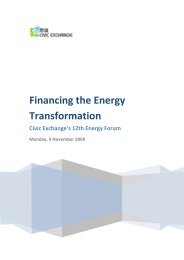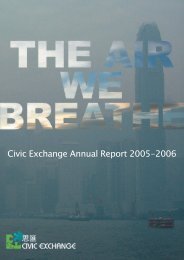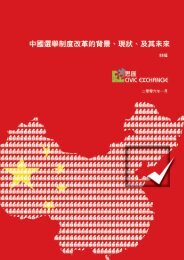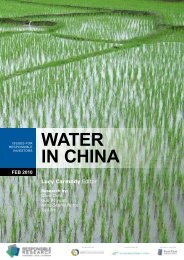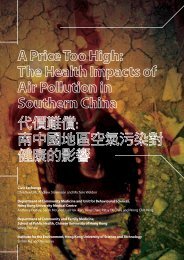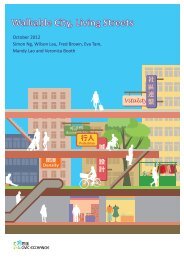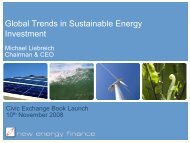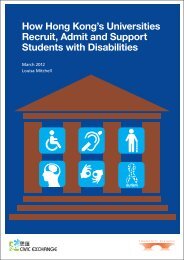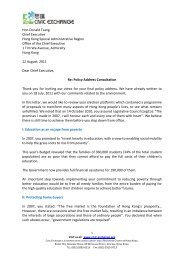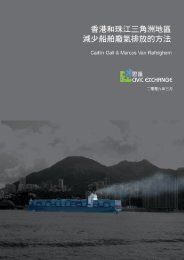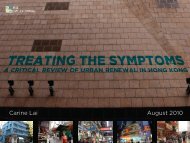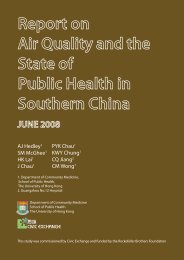Untitled - Civic Exchange
Untitled - Civic Exchange
Untitled - Civic Exchange
You also want an ePaper? Increase the reach of your titles
YUMPU automatically turns print PDFs into web optimized ePapers that Google loves.
SUSTAINABLE TRANSPORT IN HONG KONG: DIRECTIONS AND OPPORTUNITIES<br />
Diverting some gas from power generation (especially from the retrofitted coal boilers) to transport and<br />
replacing it with coal would result in a net reduction of emissions in Hong Kong, except for carbon dioxide<br />
(CO 2 ) and sulfur dioxide (SO 2 ). 167 The advantages of this switch are even greater when one considers the<br />
location of the emissions from power stations and the fact that these emissions are highly diluted by the<br />
time they affect people. 168 In contrast, the emissions from traffic on congested streets are inhaled directly<br />
and at extremely unhealthy concentrations.<br />
Replacing transport diesel fuel with natural gas would also be commercially attractive because natural gas<br />
for power plants is priced to compete with coal. Hence, gas would be cheaper than transport diesel on an<br />
equivalent energy basis. In effect, diesel consumption would be cut, while coal consumption would<br />
increase. 169 There should be no need for ongoing government financial support in making this transition.<br />
As noted above, the only environmental drawback to diverting natural gas from power to transport is the<br />
modest increase in total CO 2 and SO 2 emissions resulting from the use of coal in place of gas in power<br />
generation. 170 However, such increases should be viewed within the context of major cutbacks in CO 2 and<br />
SO 2 in Hong Kong following the introduction of natural gas for power generation in 1994. In other words,<br />
one could argue that increases are a small step backwards after a major step forward. Future emissions of<br />
carbon and sulfur will drop even further as soon as Hong Kong Electric begins using natural gas. In<br />
addition, measures to conserve electricity have great potential in Hong Kong and would help reduce both<br />
the demand for power and the emissions from power plants.<br />
NGV do have moderately higher capital costs than their diesel and petrol equivalents. It is not clear how<br />
much of this difference is due to economies of scale (far fewer NGV produced than diesel or petrol<br />
vehicles) and how much is inherent in the technology. Considering the higher capital costs, there is a case<br />
for some form of government support to encourage potential customers to try using natural gas (e.g.,<br />
reducing the first registration tax on NGV for several years). Such assistance from government would be<br />
in line with the support given for the conversion of taxis (and soon public light buses, as well) to LPG.<br />
Unfortunately, the Hong Kong government has historically taken a hands-off approach to cleaner vehicles<br />
- at least until faced with a crisis and then, as with LPG for taxis, it is forced to create incentives in order<br />
to secure user compliance and public acceptance.<br />
If a limited CNG fueling system were set up (i.e., with pipeline gas available at fueling stations and<br />
localized compression to fill the pressurized fuel tanks of vehicles), it could potentially be used not only<br />
for buses but also for medium and possibly some heavy goods vehicles, depending on trial results.<br />
• Future possibilities for NGV<br />
While there is some potential to divert gas from power generators at Castle Peak, the real potential for NGV<br />
depends on the status of the planned Liquefied Natural Gas (LNG) port facility in Guangdong. In Hong<br />
Kong, this gas supply would be used primarily to expand the generation capacity of Hong Kong Electric,<br />
50<br />
167 Ibid.<br />
168 This is not to suggest that pollution from power plants is unimportant. Some forms of pollution are damaging<br />
even when highly diluted. Sulfur emissions contribute to acid rain and carbon dioxide (CO 2 ) contributes to climate<br />
change.<br />
169 Barron W., and Steinbrecher, N., eds. (1999), Heading Towards Sustainability Practical Indicators of<br />
Environmental Sustainability for Hong Kong.<br />
170 Barron, B. (2000), Natural Gas for Transport and Industry: A Major Option for Reducing Hong Kong's Air<br />
Pollution.




